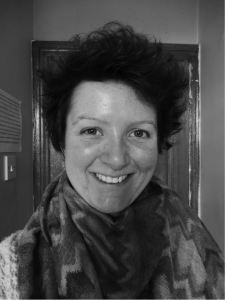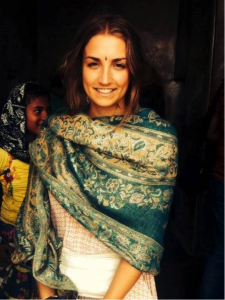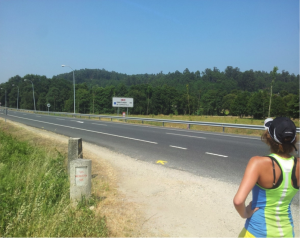Richard Scriven, SCGRG Dissertation Prize coordinator, discusses dissertations, research, and geography with the winners of last year’s prizes, Jennifer Durrant and Helen Spooner.
Annually the Social and Cultural Geography Research Group, similar to other RGS-IBG groups, offers an annual prize for the best undergraduate dissertation in social and cultural geography. The dissertations are required to be an outstanding theoretical and/or empirical piece of work which was completed in a UK Higher Education Institution for a BA/BSc level Geography degree programme. The submitted dissertations are reviewed by members of the Research Group’s Committee and an overall winner and runner-up are decided upon.
In recent years, the dissertations have been of an extremely high-quality demonstrating how undergraduates are engaging with the core concepts and themes at drive contemporary social and cultural geography. Winning dissertations have attended to a broad range of topics, including the changing understandings of home for elderly women, the culture of allotments, the mobilities of road-running, international students’ university accommodation, and young refugees’ and asylum seeker’s identity.
This year we have followed up with the most recent winners of the Dissertation Prize to discuss their research and what the acknowledgement of their work meant for them.
Jennifer Durrant, University of Cambridge
The winning dissertation, “Fallen on hard times: Re-examining the homeless hostel”, was from Jennifer Durrant, University of Cambridge. In her work, Jennifer uses feminist theory to tease out the interactions between official discourse, individual agency, and everyday practice, in the institutional space of the homeless hostel through a case study in Sheffield. Using semi-structured interviews and participant observation, she articulates an insightful and nuanced account of the experiences and lived realities of homelessness and service provision.
RS: What was the attraction of researching in the area of social and cultural geography?
JD: During university I became increasingly interested in the social and cultural side of geography because, for me, this is the area that offers some of the most fascinating and complex insights into the most pressing issues of our time. I really like the way that social/cultural geographers don’t just examine the cold realities of social processes, power relations and inequalities, but also analyse how they are perceived, portrayed and experienced by different people.
RS: How did you choose your research topic? What was your motivation?
JD: I’d already done some volunteering with homeless people, both on the streets and in hostels, during my first two years at university…Homelessness is a huge issue, and yet it is rarely given the consideration it needs. When people do talk about ‘the homeless,’ it is often as if they are all dangerous, lazy, mad or incompetent. In my experience, they’re the opposite. So I wanted to learn about how these stigmatised individuals deal with the immensity of social, physical and emotional hardships they face. I also wanted to examine how we as a society respond to them, in terms of both daily interactions and formal social support systems.
RS: What was the research experience process like for you? What did you get from it?
JD: The hostel staff and residents were extremely welcoming and keen to help…I was careful to build up honest relationships of trust with the participants, and I think that really helped; after a few days, they started coming to me and asking to be interviewed. I realised that, particularly if their voices are ignored by society, people are often pleased to find that someone wants to hear about their life and opinions… For me, it was a real privilege to be allowed into their world, to witness the daily life in the hostel and to hear about the challenges and triumphs the staff and residents experience. It was difficult at times, especially when a participant discussed past traumas or the debilitating prejudice and hardships they now face. It was a stark reminder of how vulnerable we all are to homelessness, and how much the support system needs to be improved. But it was also really uplifting, and humbling, for me to watch these people for whom life has not been easy come together and support each other. Despite their difficulties, many of the residents remained cheerful, and they kept working hard to provide for their children, look after ageing parents and deal with their own personal or medical problems, all without a home. And, in spite of cuts to wages and funding, and long hours of emotionally and physically demanding work, the staff were still incredibly friendly and caring. Overrall, my time doing research in the hostel was by far the most rewarding part of my degree, because of the people I met: they were truly inspiring.
RS: What do you think is the social/cultural resonance of studying homelessness? And, how it might contribute to contemporary debates?
JD: Homelessness is an immensely important issue for society, because it affects us all. Often acutely, because we’re all vulnerable: I’ve met people who had a first-class degree, a stable job, a supportive family – and still became homeless. It can happen to anyone. But also, at a deeper level, it represents how we collectively deal with inequalities, social disadvantage, economic changes, mental illness and many other complex social problems. Homelessness is entwined within all of these issues…Academically, studies of homelessness are crucial because they reveal how we as a society perceive the balance between personal responsibility and structural inequalities.
RS: Would you care to say a few words on winning the prize?
JD: I’m absolutely flattered to have won, so thank you very much. I worked hard on my dissertation because I care about the topic and because I wanted to do justice to the inspiring people I’d met, but I never expected anything like such a prestigious award. I just hope that it helps to further raise awareness of the human side of homelessness, and its importance for us all.
Helen Spooner, University of Oxford 
The runner-up was Helen Spooner, University of Oxford, whose dissertation was titled: “A kinaesthetic spirituality: An autophenomenographic account of running 250km of the Camino Portugués”. Deploying a phenomenological appreciation of landscape, she presented a layered and evocative experiential account of running 250km of el Camino Portugués over 6 days. Helen’s ‘autophenomenographic’ methodology drew on contemporary discussions of embodiment, performance, and self-reflexivity to explore the emergence of the self and landscape in the context of a pilgrimage trail.
RS: Why did you choose to study geography? And, what was the attraction of researching in the area of social and cultural geography?
HS: I have always been interested in the relationship of humanity with the environment, and I think they are quite aptly embodied in my dissertation: considering how we interact and construct the world around us as we move through it. I’ve always been interested in the human side of geography, so choosing to research in the area of social and cultural geography was an easy decision.
RS: What do you think you got from studying geography?
HS: Geography taught me most about power relations. Most specifically those subtle power relations that we negotiate day to day. I think this was what led to my ultimate fascination with non-representational theory, and the idea that in representing something, you define it, and foreclose the possibility of it being otherwise. I was really interested in these sort of power dynamics, and I think geography is having important conversations about opening up various hegemonic discourses to interrogate how they have been constructed. Geography has let me explore those more marginalized voices and discourses, and taught me that everything should be interrogated critically.
RS: What was the research experience process like for you? What did you get from it?
HS: I was injured on the first day of running the Camino, which came as a huge shock as I hadn’t had an injury in so long. That made the prospect of the next 5 days all the more daunting, especially as it was auto-ethnographic research, and I was the subject, so I was really forced to engage in a lot of self-reflection. It was a huge learning curve and an exercise of character-building; I learnt a lot about myself and my own motivations for running, which I think was an important outcome.
RS: What do you think is the social/cultural resonance of studying the increasingly popular Camino?
HS: I think the Camino specifically as a site of study offers a great deal to those interested in the practice of mobilities and non-representational theory. As these literatures pay a great deal of attention to practice, to how we construct the world around us via the means by which we move, the Camino (in all its materiality and spirituality) offers an interesting space to explore different methodologies of how we might explore these in practice. It seems to have the potential to be a really interesting site to experiment with new methodologies for ‘doing’ geography. Inherently concerned with movement, the Camino is all about the journey – not necessarily the destination. I think this attention to what I can only describe as ‘mindfulness’, of appreciation of the present, speaks to a lot of people.I equally think a lot of people are seeking to engage in a sort of mindfulness. Everyone seems to be living increasingly busy life, whizzing around from A to B without the time to slow down and appreciate the present. The Camino lets you do that. I guess that is the very purpose of the Camino; reaching Santiago is of course a real achievement, but I think it’s more about the very process of getting there – of finding your way along The Way.
RS: Would you care to say a few words on winning the prize?
HS: I would like to say a huge thanks to the Social and Cultural Research Group for recognizing my dissertation – I am so chuffed and shocked to have been awarded a prize. It makes the 6 days of pain seem all the more pleasant in retrospect! I’d also like to say a huge thanks to the people that supported me most throughout the research and write-up process: my Dad for putting up with me for those gruelling 250km, and for all his achievements in doing it with me; Thomas Jellis, my tutor at Hertford College was fantastic and really pushed me to take some risks that I wouldn’t otherwise have taken; and Marcus – a real geographer who was an invaluable soundboard.
The closing date for submissions for this year’s prize is July 10.
